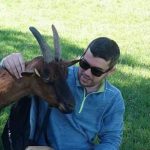










Emmanuel Artus is an agricultural engineer specializing in the study of agricultural systems and development.
In 2025, he and Anouk Fraisse conducted an agricultural assessment in the Livno region of Bosnia and Herzegovina. Together, they analyzed the strong interactions between agriculture and the landscape in the production area of Livno Cheese PGI. Based on this study, they created the photographic exhibition “Empreintes de pastoralisme” (Traces of Pastoralism), which they present at events on the theme of livestock farming.
Sarajevo | Photo Exhibition Opening: “Imprints of Pastoralism”

Jimmy Balouzat is an agricultural engineer specialising in supporting agricultural and food transitions.
As an associate consultant at AIR coop, he assists agricultural sectors in their structuring, as well as local authorities in the implementation of their food policies: local food projects, combating food insecurity, sustainable collective catering and short supply chain logistics, combining expertise in production systems and collective food strategies.
In 2017, he conducted an agricultural assessment in Kosovo with Elise Chau as part of a project to create a geographical indication for Sharr cheese. Since then, he has been involved in embedded research projects with AIDA.
Further information:

Claire Bernard works to support environmental transitions from the local to the global level, particularly at the interface between scientific research and public policy-making.
A political scientist by training, she specialised in natural resource management in an international context, within the framework of official development assistance in countries in the Global South (Mexico, India, Tunisia), then in the context of the accession process of candidate countries to the European Union in the Western Balkans. With a PhD in management sciences, she is particularly interested in the development of collective strategies for environmental purposes and their implementation.
Since 2012, she has been working on agro-environmental issues in the Euro-Mediterranean region. In ‘embedded research’, with the aim of producing results for the collective, the territories and for research, she strives to build spaces for dialogue between practitioners (farmers, producers, associations), knowledge producers (universities, think tanks, specialised institutes, etc.) and public policies (European, national, local).
She worked at the Mediterranean Agronomic Institute of Montpellier (2012-2017), where she was responsible for managing and coordinating various agro-environmental programmes. She is currently at the Ministry of Agriculture and Food and is an associate researcher at the Montpellier Management Research Laboratory (MRM – Host Team 4557).

During a gap year in the middle of her agricultural engineering studies, Orianne Crouteix confronted the theoretical concepts she had previously learned with the very diverse realities on the ground (Benin, Laos, French Guiana). Drawing on these experiences, she chose to focus on environmental issues, addressing both ecological and human challenges.
In Albania, she worked on issues relating to the ownership and use of forest and pastoral land.
Being naturally curious, she decided to explore the mechanisms behind the development of environmental issues and analyse the responses provided by an operational structure through a thesis in geography: this CIFRE thesis, carried out within the ‘Europe and International’ delegation of the Conservatoire du Littoral, focuses on the protection of biodiversity on the small islands of the western Mediterranean. She is particularly interested in the relationships that play a role in environmental actions.
Convinced of the importance of addressing environmental issues through resolutely multidisciplinary approaches, she is mainly interested in issues of natural resource governance, property rights, and actors involved in the management of common goods. Her research, which is focused on operational work, demonstrates her interest in combining fieldwork, theory, and actors in environmental action.

Engineer specialising in agricultural development
In order to obtain her engineering degree from AgroParisTech, Tamy Cyrus joined the ANR Pix Illyrica project and carried out an agricultural assessment in south-eastern Albania. She became interested in recent trends towards specialisation in production systems and new land tenure dynamics.
She supplemented this training with a period of study in economics at Laval University in Canada to consolidate her skills in analysing agricultural systems.
She has participated in numerous projects in field crops and arboriculture in France, where she has focused on assessing the economic and social viability of production systems, as well as their diversification and the integration of practices more compatible with the sustainable use of natural resources.

Alice Garnier is an agricultural engineer specialising in pastoralism and rural territorial development.
She has conducted research-action at the agriculture-environment interface in the Balkans, where she has carried out studies of agricultural systems, value chain analyses and eco-pastoral diagnostics.
As a project manager at the Institut Agro, her current activities focus on sustainable livestock farming and pastoralism in technical agricultural education.

Agricultural engineer specialising in rural development, project manager in food security.
A graduate of AgroParisTech with a major in Agricultural Development, Simon Gontard became interested in pastoral management issues in south-eastern Albania, where he conducted an agricultural assessment in partnership with the BiodivBalkans project (CIHEAM) and the University of Zurich (ETH).
Since 2017, Simon has been interested in the links between livestock development and food security in developing countries. On assignment in Sudan, Uganda and North Korea for consulting firms and NGOs, Simon implements university partnership projects and supports the production and processing of animal products in order to improve the nutritional status of the target populations.

Agricultural scientist expert in regional development, agri-environment and natural environment management.
Chloé Lerin carries out academic and professional projects related to ecology and agro-environment in France and Europe. With a keen interest in agricultural practices and natural spaces, she focuses her projects on the sustainable and dynamic management of natural spaces, including agricultural activities that benefit agro-biodiversity at various scales.
Convinced of the importance of systemic analysis, she has acquired skills that enable her to understand socio-agro-ecosystems from different angles: biology, ecology, agronomy, economics and sociology. For her final thesis, she carried out an agro-environmental assessment of the Dalmatian islands in Croatia and took a particular interest in High Nature Value (HNV) farming.

Specialist in agro-environmental issues (international regimes, public policies and local development situations, pastoralism, geographical indications, and agro-biodiversity).
François Lerin is a member of the Scientific Council of the Causses and Cévennes, a Mediterranean agro-pastoral cultural landscape listed as a UNESCO World Heritage Site.
For 35 years, he was scientific administrator of the Mediterranean Agronomic Institute of Montpellier of CIHEAM, an intergovernmental organization dedicated to agriculture and rural development in the Euro-Mediterranean region. He was also administrator of Solagral (1981-2004), an NGO promoting agricultural and food solidarity on a global scale. From 1989 to 2012, he was editor-in-chief, director, and then co-director of Le Courrier de la Planète, a knowledge brokerage magazine dedicated to global, agricultural, environmental, and development issues.
He holds a PhD in economics but describes himself as a “social scientist.” He has written a number of articles and books on agricultural policy, international markets, and local development situations.
Over the past 20 years, he has specialized in agro-environmental issues, based on a multi-scalar analysis of survey situations, particularly in the Western Balkan countries, in the context of their accession process to the European Union.
He coordinated an action research program funded by the French Global Environment Facility (FFEM) on the conservation of agrobiodiversity in the Balkans (BiodivBalkans, 2012-2017) and a European research program (H2020) on innovations in High Nature Value farming, bringing together 13 partner institutions working in a network across ten learning sites throughout Europe (HNV-Link, 2016-2018).
In the 2020s, he continues to work using multidisciplinary approaches in the social sciences in “embedded research” situations, still in the Western Balkans (Montenegro, North Macedonia, Serbia, Albania, Kosovo, Bosnia & Herzegovina), based on field surveys and mediation with public actors. He still finds some time to continue to unravel certain aspects of “global issues,” particularly environmental ones.

PhD student in geography, economist and specialist in public policy on agriculture and rural development in Albania.
After studying economics at the European University of Tirana and working for three years in Albania as an economist, Roland Marku specialised in rural development issues by completing a Master’s degree in Agricultural Management and Land Use at the Mediterranean Agronomic Institute of Montpellier. In 2016-17, he completed a research master’s degree on the statistical and cartographic analysis of developments in the livestock sector in Albania since 1990.
He is currently a doctoral researcher in Geography and Spatial Planning at Paul Valéry University in Montpellier, where he is continuing his analysis of the livestock sector in Albania, with a particular focus on the development and adaptation of public policy instruments in the context of EU accession and changes in territorial dynamics, particularly in pastoral regions.
Roland Marku also translates documents from French into Albanian for the association.
